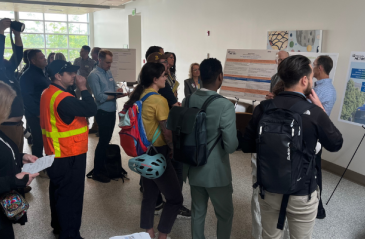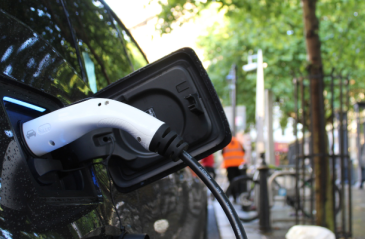
The information barriers holding back climate action and how to break them

More than 800 million Africans do not have internet access
Share articleGovernments need to learn the successful infrastructure practices from other countries
Share articleMaking the internet relevant requires local-language content, apps and services
Share articleWe put our vision for government into practice through learning partner projects that align with our values and help reimagine government so that it works for everyone.
Africa is going digital. Be it mobile money transactions, Uber-style delivery services, or e-commerce platforms, countless African examples can be found where consumers and businesses are benefiting from the digital economy. In five of the continent's largest countries - Nigeria, Egypt, Kenya, South Africa and Morocco - internet penetration is now close to the global average. With examples like these, it's not hard to imagine Africa's future being digital.
But the future is not evenly distributed. More than 800 million Africans do not have internet access. Many live in rural areas and have no access to infrastructure; others simply cannot afford to connect to the internet, even where it is available. The young and the urban are twice as likely to have internet access as the old and the rural. The richest 60% are three times more likely to be connected than the bottom 40%; women are only half as likely to have internet access as men; and others simply do not see the benefits of using the internet. Lack of basic literacy or digital literacy is also a big drag on usage.
Reducing poverty, hunger and inequality, improving health and education - and achieving many more of the UN's Sustainable Development Goals - depend on having an accessible, affordable internet and citizens with the skills to use it. The economic rationale for the necessary investment is clear, too: in work commissioned by ICANN, the Boston Consulting Group estimated that countries can - conservatively - increase GDP by 2%-3% by removing the barriers holding back their internet economy.
Four areas need concerted attention: more widespread internet infrastructure, more affordable services, relevant local digital content and higher digital literacy skills. Successful countries have taken a comprehensive, multi-stakeholder approach to addressing these challenges.
Infrastructure access is a prerequisite. Governments can leverage the successful practices of other countries, initially by defining a long-term digital strategy - including a national broadband plan - and establishing a transparent, independent regulatory framework. Policymakers also need to promote competition, as this tends to encourage investment, drive innovation and reduce prices, while incentivising collaboration between network providers through support for network sharing.
Underpinning such priorities should be a drive for cross-border collaboration in areas such as regulatory policy, spectrum allocation and trade. For example, In East Africa the removal of mobile roaming charges resulted in a 950% increase in traffic between Rwanda and Kenya within weeks.
Affordability is a significant challenge. According to A4AI, not a single emerging or developing country can claim to meet the UN's broadband affordability benchmark. But several initiatives can bring costs down. Reducing taxes on devices and access can lead to significant progress. Côte d'Ivoire is leading the way: its government's decision in 2015 to slash taxes on mobile phones from 27% to less than 7% is one positive example. And while spectrum auctions should be seen as opportunities to attract infrastructure investment, rather than as major revenue-generating initiatives, governments should also promote the deployment of DNS root server instances and internet exchange points (IXPs) to enhance local connectivity and resiliency, and reduce costs. Of roughly 500 IXPs worldwide, only about 30 are in Africa.
Local digital content also needs to be encouraged. Making the internet a relevant resource requires local-language content, applications and services. Proven steps include removing the hurdles facing small businesses in areas such as trade, tax and the recruitment of skilled employees. Policymakers can also seek to digitise government services in order to increase citizen involvement, improve the quality of services, and raise efficiency. Nigeria's electronic ID system revealed that there were 62,000 ghost workers in the public sector, while Nairobi's water utility was able to significantly cut the time for fixing outages by using customer feedback.
Alternatively, policymakers can encourage tech hubs to provide the necessary infrastructure and entrepreneurial environment for new business creation. Similarly, promoting local hosting of websites and registration under local country domains to improve website performance offers significant potential.
But they also need to remember that skills need building. Basic literacy often holds back internet adoption and use. In sub-Saharan Africa, over 40% of adults, half of women, and more than 30% of young people are illiterate. Actions that can make a difference include a drive for full school enrolment, especially for girls; creating digital literacy programmes for those no longer in the formal education system; and promoting shared facilities to help expose communities to the benefits of internet access, particularly in remote areas.
Each country needs to identify which problems affect it most severely, and develop relevant solutions. A multi-stakeholder approach involving governments, the private sector, civil society and NGOs can be very effective in building consensus on the most effective policies and actions to adopt.
Significant and lasting investments are needed to deliver the internet to all Africans. Some may baulk at the magnitude involved, but government leaders should ask themselves what the costs of inactionare. They are high, too - fewer jobs and slower economic development, a bigger digital divide, poorer education, worse healthcare and lower life expectancy. For far-sighted leaders, the answer will be clear.











